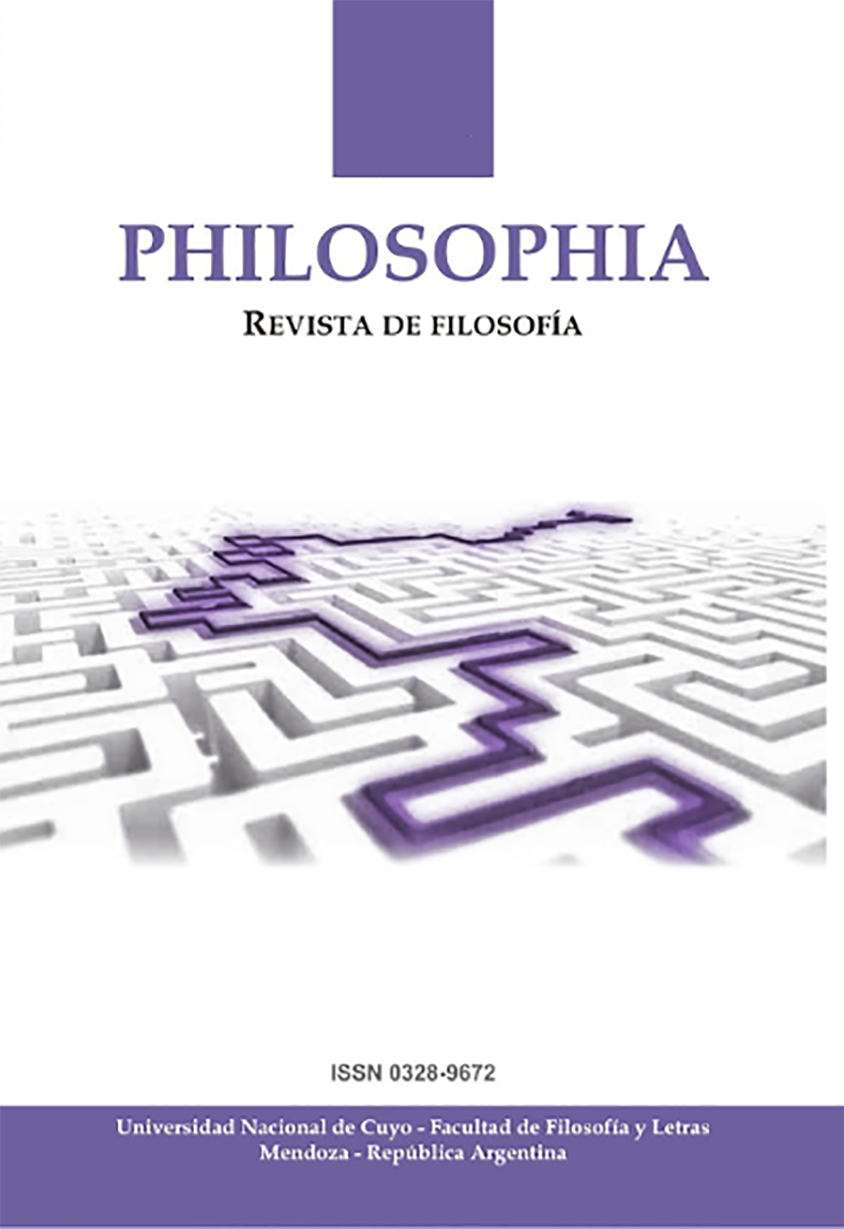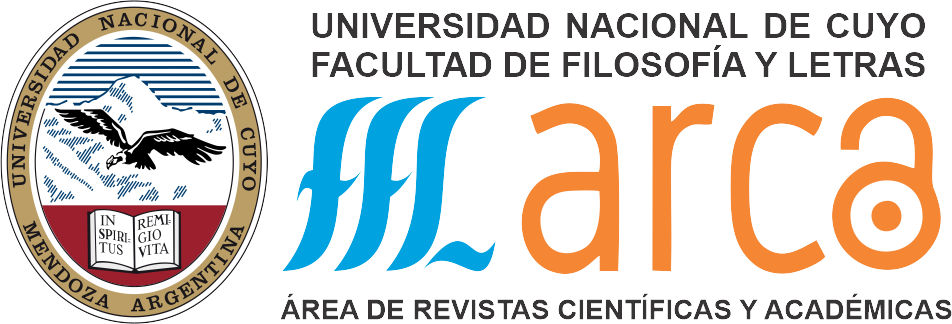The Bodily Feeling between Hylomorphism and the Cartesian Perspective
DOI:
https://doi.org/10.48162/rev.50.011Keywords:
hylomorphism, bodily feeling, Aristotle, RosminiAbstract
The present article offers a contribution to a first-person ontology, as required by Searle for the mental. It takes recourse to Antonio Rosmini’s philosophy of the fundamental bodily feeling, which corresponds to what is usually called lived or subjective body (Leib). After revising several contemporary versions of hylomorphism, I conclude that not just any of them is convincing for the philosophy of mind. With the notions of principle and term Rosmini widens the ontological repertory in order to explicate the unity of the human being, incorporating those of matter and form from a lato sensu Cartesian perspective.
References
Aristóteles. Acerca del alma, trad. Tomás Calvo Martínez. Madrid: Gredos, 2000.
Austin, Christopher J. “A Biologically Informed Hylomorphism”. En Neo-Aristotelian Perspectives on Contemporary Science, eds. W. M. R. Simpson, R. C. Koons y N. J. The, 185-210. London: Routledge, 2017.
Baertschi, Bernard. L’ontologie de Maine de Biran. Fribourg: Presses Universitaires, 1982.
Bailey, Andrew y Wilkins, Shane Maxwell. “Contemporary Hylomorphism”, Oxford Bibliographies (2018). Doi: 10.1093/OBO/9780195396577-0363.
Bazán, Carlos. “The Human Soul: Form and Substance? Thomas Aquinas’ Critique of Eclectic Aristotelianism”, Archives d’Histoire Doctrinale et Littéraire du Moyen Âge, 64 (1997): 95-126.
Bennett, Max R. y Hacker, Peter M. S. Philosophical Foundations of Neuroscience. Oxford: Blackwell, 2003.
Brower, Jeffrey. Aquinas’s Ontology of the Material World: Change, Hylomorphism, & Material Objects. Oxford: Oxford University Press, 2014.
Changeux, Jean-Pierre y Ricoeur, Paul. Lo que nos hace pensar. La naturaleza y la norma. México: FCE, 2001.
Christofidou, Andrea. “Self and Self-Consciousness: Aristotelian Ontology and Cartesian Duality”, Philosophical Investigations, 32:2 (2009): 134-162. Doi: 10.1111/j.1467-9205.2008.01367.x
De Haan, Daniel D. “Hylomorphic Animalism, Emergentism, and the Challenge of the New Mechanist Philosophy of Neuroscience”, Scientia et Fides, 5:2 (2017): 1-30.
De Haan, Daniel D. “The Interaction of Noetic and Psychosomatic Operations in a Thomist Hylomorphic Anthropology”, Scientia et Fides, 6:2 (2018): 1-29.
Feser, Edward. Philosophy of Mind. A Beginner’s Guide. London: Oneworld, 2005.
Feser, Edward. “Aquinas on the Human Soul”. En The Blackwell Companion to Substance Dualism, eds. J. J. Loose, A. J. L. Menuge y J. P. Moreland, 88-101. Oxford: Wiley-Blackwell, 2018.
Gasser, Georg. “Is Hylomorphism a Neglected Option in Philosophy of Mind?”. En Soul. A comparative approach, eds. Ch. Kanzian y M. Legenhausen, 43-61. Heusenstamm bei Frankfurt - Lancaster: Ontos-Verlag, 2010.
Hasker, William. The Emergent Self, Ithaca-London: Cornell University Press, 1998.
Henry, Michel. Philosophie et phénoménologie du corps. Essais sur l’ontologie biranienne. París: PUF, 2011 [19651].
Jaworski, William. The Philosophy of Mind: A Comprehensive Introduction. New York: Blackwell, 2011.
Jaworski, William. “Hylomorphism: Emergence Properties without Emergentism”. En Biology and Subjectivity. Philosophical Contributions to Non-reductive Neuroscience, eds. M. García-Valdecasas, J. I. Murillo y N. F. Barrett, 41-61. Switzerland: Springer, 2016.
Jaworski, William. Structure and the Metaphysics of Mind. Washington D.C.: CUA Press, 2016.
Koons, Robert C. “The ontological and epistemological superiority of hylomorphism”, Synthese, 198, Suppl 3 (2017): 885-903. Doi: 10.1007/s11229-016-1295-6.
Koslicki, Kathrin. The Structure of Objects. New York: Oxford University Press, 2008.
Loose, Jonathan J., Menuge, A. J. L. y Moreland, J. P. (eds.). The Blackwell Companion to Substance Dualism. Oxford: Wiley-Blackwell, 2018.
Lowe, E. J. “Non-Cartesian substance dualism and the problem of mental causation”, Erkenntnis, 65 (2006): 5-23.
Madden, James. Mind, Matter & Nature. A Thomistic Proposal for the Philosophy of Mind. Washington, D.C.: CUA Press, 2013.
Maine de Biran, Marie-François. “Note sur l’idée d’existence”. En Œuvres, vol. X-1, ed. B. Baertschi, 211-299. París: Vrin, 1989.
Manning, Gideon. “The History of «Hylomorphism»”, Journal of the History of Ideas, 74:2 (2013): 173-187. Doi: 10.1353/jhi.2013.0018.
Marmodoro, Anna. “Aristotle’s hylomorphism, without reconditioning”, Philosophical Inquiry, 36 (2013): 5‐22. Doi: 10.5840/philinquiry2013371/28.
Martínez Barrera, Jorge. “El alma y su persona. La relación mente-cuerpo según Aristóteles y su interpretación por Santo Tomás de Aquino”, Hypnos, 10:14 (2005): 39-55.
McGinn, Marie. “Real Things and the Mind Body Problem”, Proceedings of the Aristotelian Society, 100:1 (2000): 303-317. Doi: 10.1111/j.0066-7372.2003.00018.x
Mercier, Désiré et al. Traité élémentaire de philosophie à l’usage des classes. Louvain: Institut Supérieur de Philosophie, 1906.
Nobile, Mauro (ed.). Rosmini e la fenomenologia. Trento: Università degli Studi di Trento, 2020.
Nys D. “L'hylémorphisme dans le monde inorganique”, Revue néo-scolastique, 11:41 (1904): 35-57.
Oderberg, David S. Real Essentialism, London: Routledge, 2007.
Pasnau, Robert. “Form, Substance, and Mechanism”, The Philosophical Review, 113:1 (2004): 31-88.
Pasnau, Robert. “Mind and Hylomorphism”. En The Oxford Handbook to Medieval Philosophy, ed. J. Marenbon, 486-504. Oxford: Oxford University Press, 2012.
Pesch, Tilmann. Institutiones Philosophiae Naturalis secundum principia S. Thomae Aquinatis. Freiburg an Main: Herder, 1880.
Piemontese, Filippo. La dottrina del sentimento fondamentale nella filosofia di A. Rosmini. Milán: Sodalitas, 1966.
Robinson, Howard. “Naturalism and the Unavoidability of the Cartesian Perspective”. En Contemporary Dualism. A Defense, eds. A. Lavazza y H. Robinson, 154-170. Abingdon: Routledge, 2014.
Rosmini, Antonio. Epistolario filosófico, ed. G. Bonafede. Palermo: Fiamma Serafica, 1968.
Rosmini, Antonio. Psicologia, vol. I. En Opere di Antonio Rosmini, vol. 9, ed. V. Sala. Roma-Stresa: Città Nuova, 1988.
Rosmini, Antonio. Nuovo saggio sull’origine delle idee. En Opere di Antonio Rosmini, vols. 3-5, ed. G. Messina. Roma-Stresa: Città Nuova, 2003-2005.
Sanguineti, Juan José. Filosofía de la mente. Un enfoque ontológico y antropológico. Madrid: Palabra, 2007.
Sanguineti, Juan José. “Intelecto y sensibilidad. ¿Es dualista Tomás de Aquino?”. En Sobre los tipos y actos de conocimiento. Cognoscens in actu est ipsum cognitum in actu, eds. C. A. Casanova Guerra e I. Serrano del Pozo, 527-553. Santiago (Chile): Ril Editores, 2018.
Sanguineti, Juan José. Cuerpo, mente y ser personal. Logos: Pilar-Rosario, 2019.
Searle, John. The Rediscovery of the Mind. Cambridge, MA: MIT Press, 1992.
Spiri, Silvio. Essere e sentimento. La persona nella filosofia di Antonio Rosmini. Roma: Città Nuova, 2004.
Stump, Eleonore. “Non-Cartesian Substance Dualism and Materialism without Reductionism”, Faith and Philosophy, 12 (1995): 505-531. Doi: 10.5840/faithphil199512430.
Swinburne, Richard. The Evolution of the Soul. Oxford: OUP, 1986.
Wilkes, Kathleen V. “Psuchē versus the Mind”. En Essays on Aristotle’s De Anima, eds. M. Nussbaum y A. Rorty, 109-127. Oxford: Oxford University Press, 1992.
Downloads
Published
How to Cite
Issue
Section
License
Copyright (c) 2022 Juan Francisco Franck

This work is licensed under a Creative Commons Attribution-NonCommercial-ShareAlike 3.0 Unported License.
Se permite la reproducción de los artículos siempre y cuando se cite la fuente. This work is protected under license Attribution-NonCommercial-ShareAlike 3.0 Unported (CC BY-NC-SA 3.0) You are free to: Share "” copy and redistribute the material in any medium or format; Adapt "” remix, transform, and build upon the material
The licensor cannot revoke these freedoms as long as you follow the license terms.
Under the following terms:
Attribution "” You must give appropriate credit, provide a link to the license, and indicate if changes were made. You may do so in any reasonable manner, but not in any way that suggests the licensor endorses you or your use.
NonCommercial "” You may not use the material for commercial purposes.
ShareAlike "” If you remix, transform, or build upon the material, you must distribute your contributions under the same license as the original.
No additional restrictions "” You may not apply legal terms or technological measures that legally restrict others from doing anything the license permits.
For more information, please visit: https://creativecommons.org/licenses/by-nc-sa/3.0/deed.en















